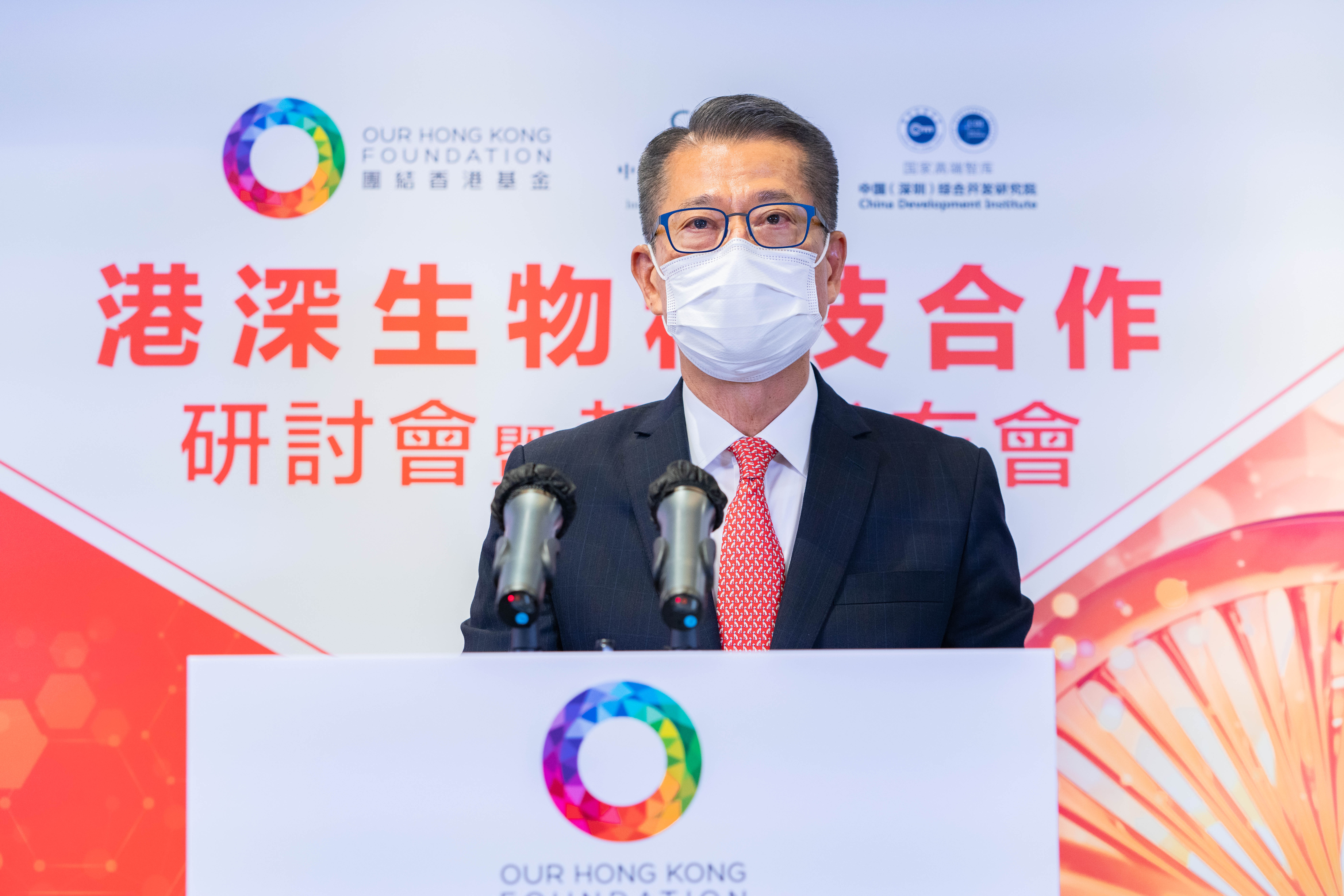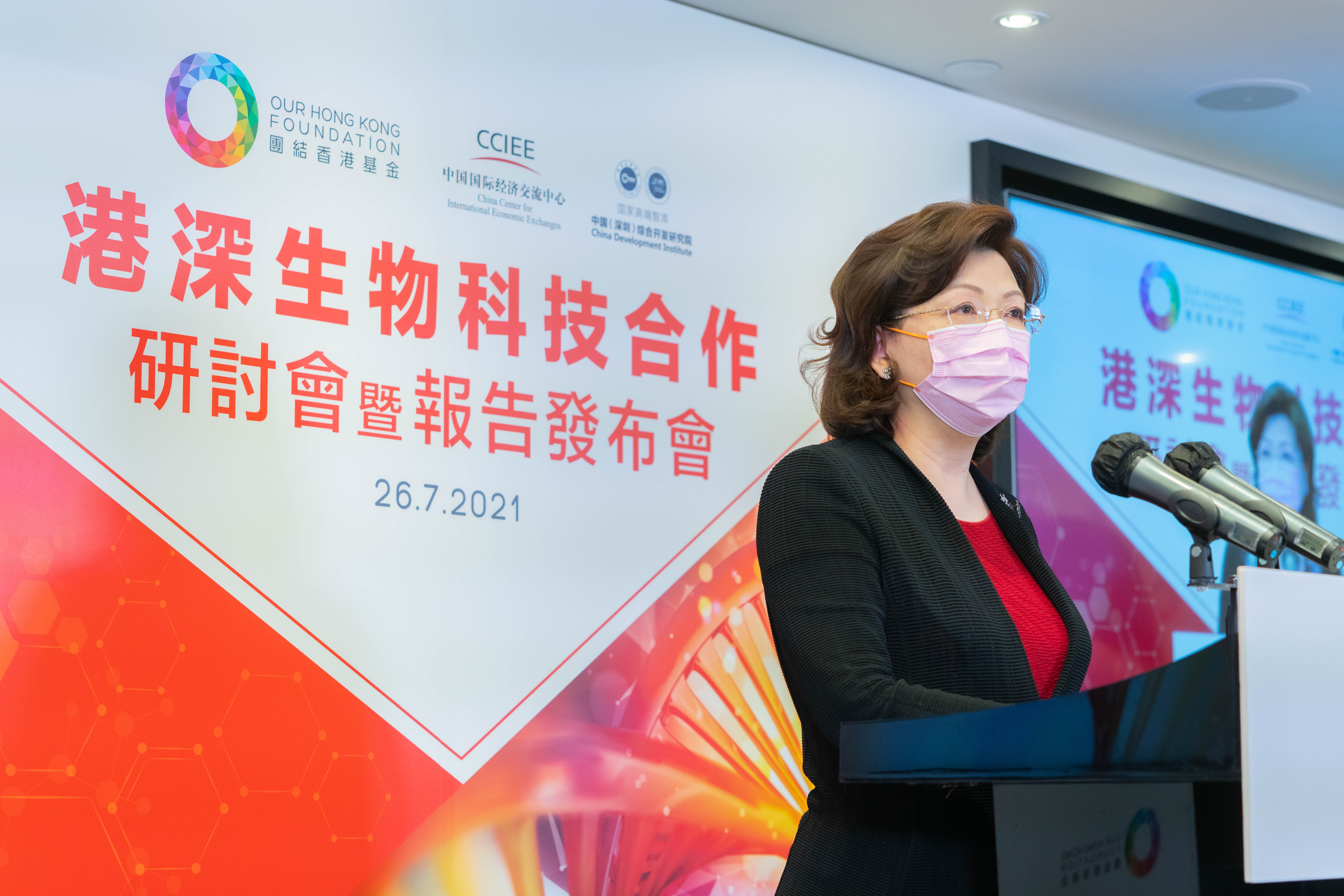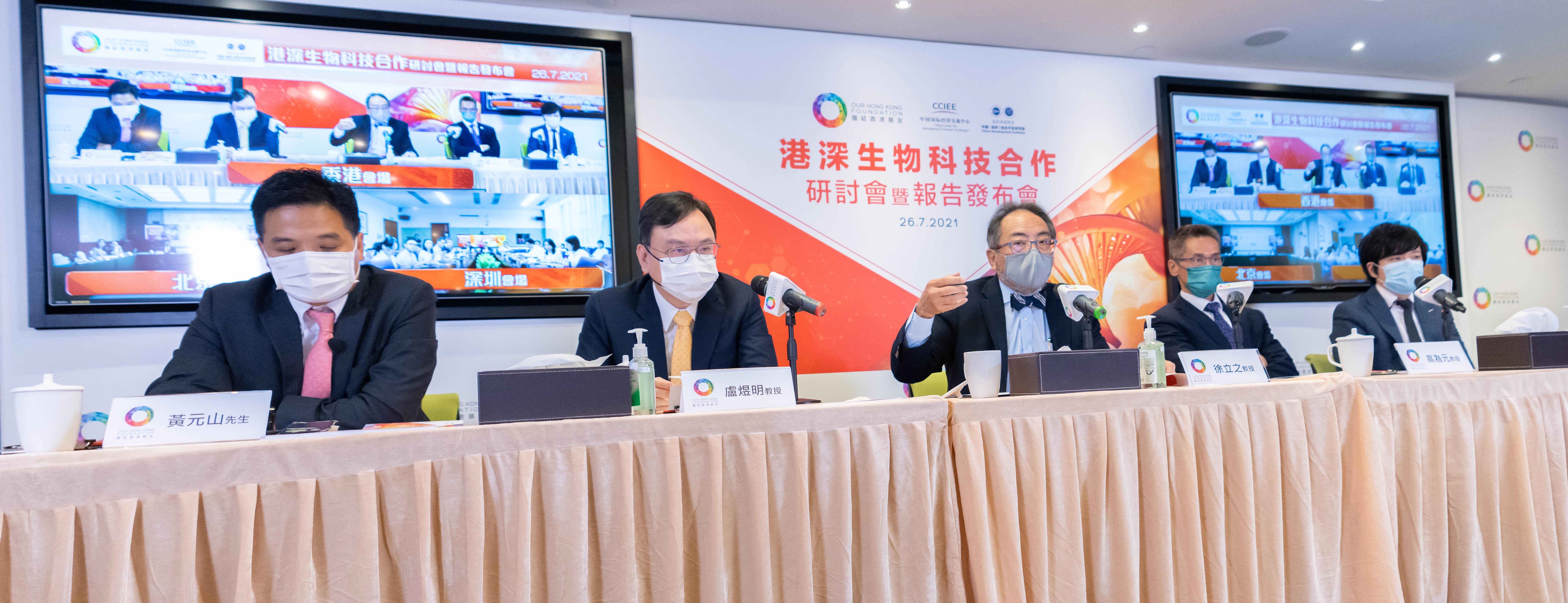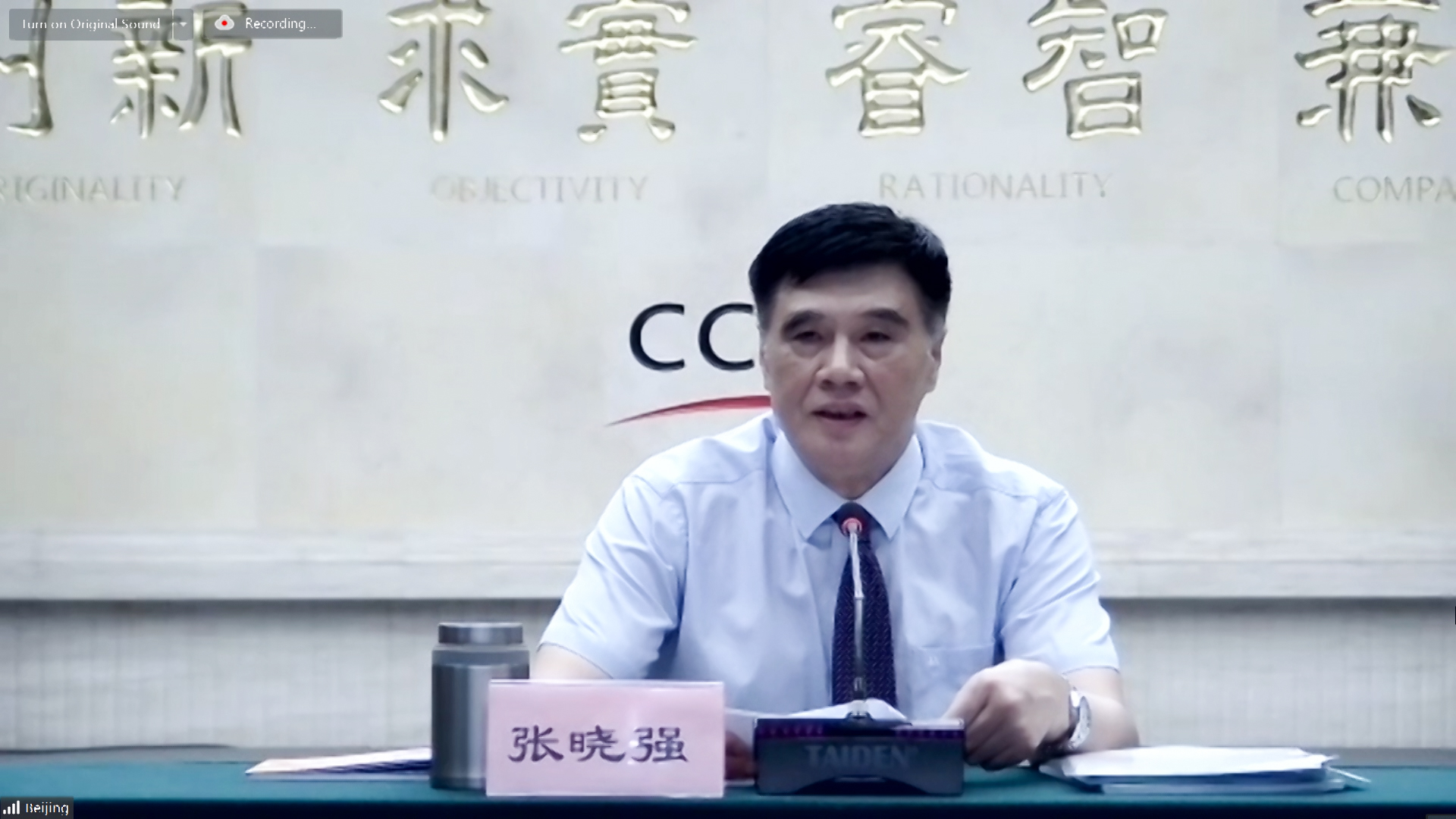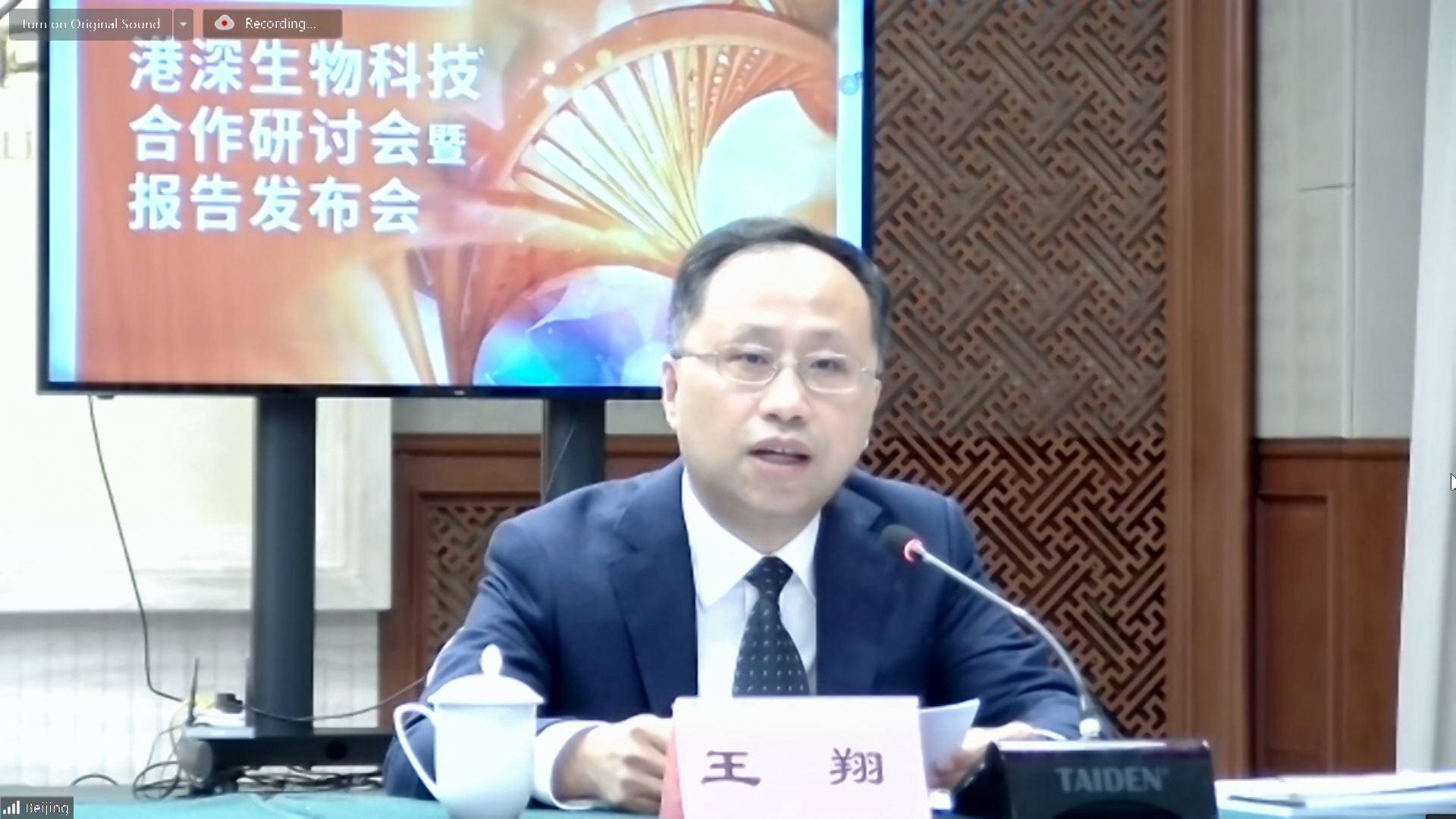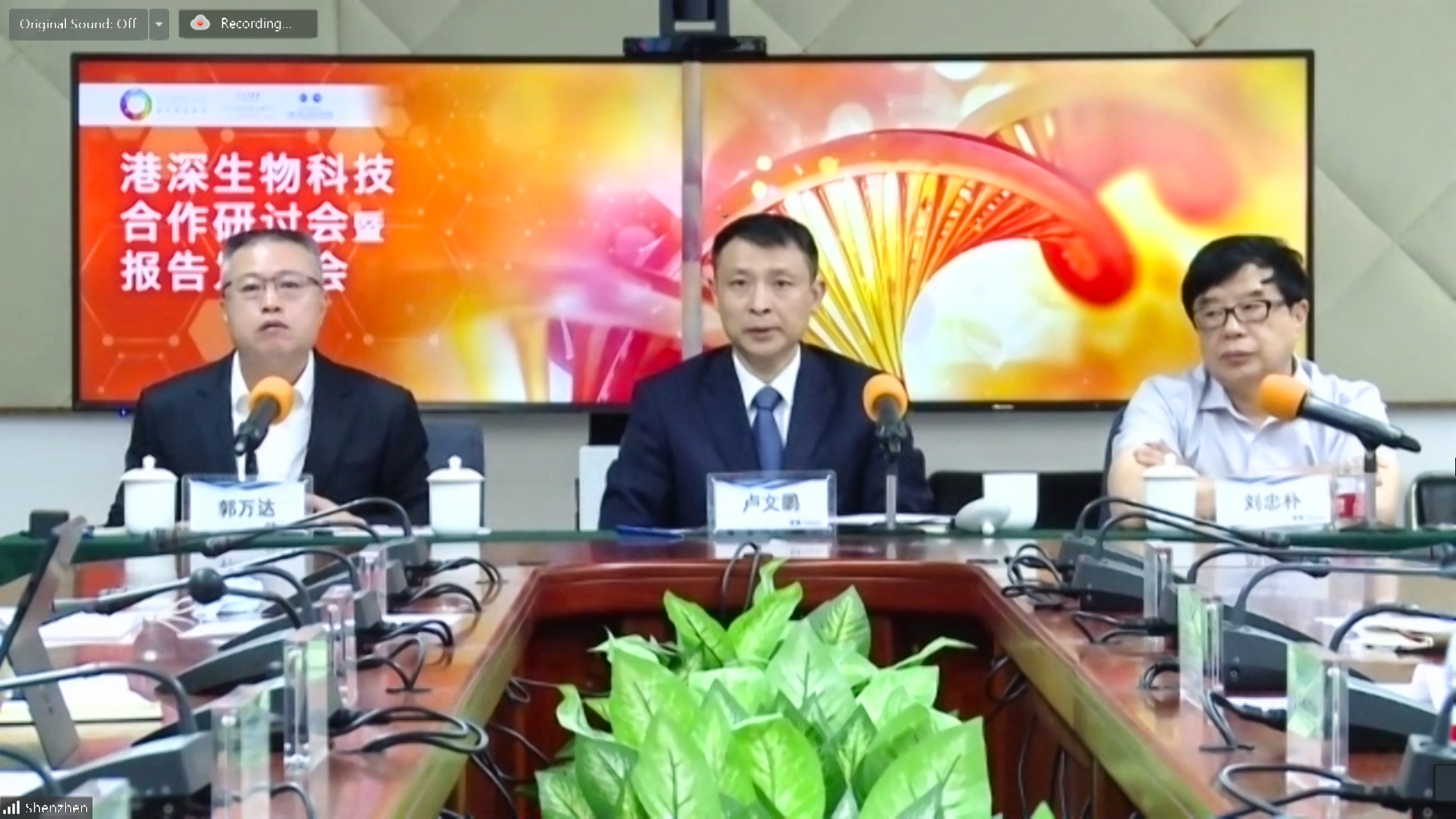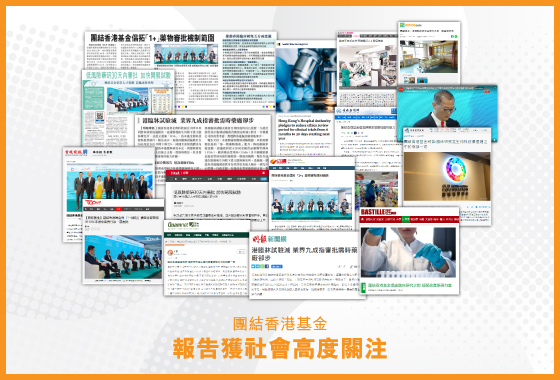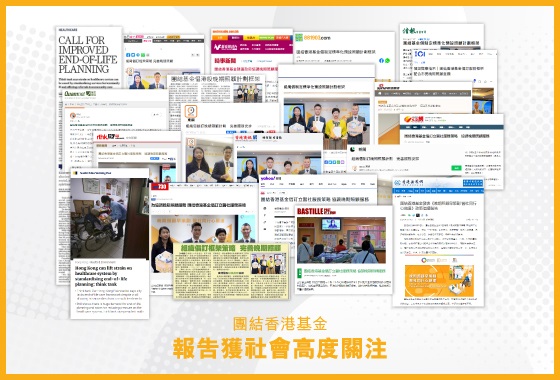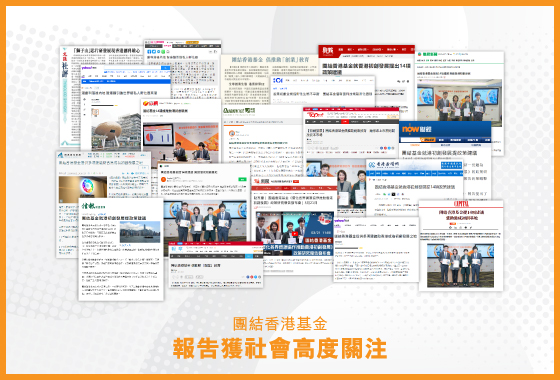OHKF and Two Leading Chinese Think Tanks Jointly Release Research Report on Hong Kong-Shenzhen Biotechnology Collaboration
OHKF and Two Leading Chinese Think Tanks Jointly Release
Research Report on Hong Kong-Shenzhen Biotechnology Collaboration
(26 July 2021, Hong Kong) Our Hong Kong Foundation (OHKF) collaborates with two top Chinese think tanks to map out the strategy for collaboration between Hong Kong and Shenzhen in biotechnology development by leveraging the synergistic effects of the Hetao Shenzhen/Hong Kong Innovation and Technology Co-operation Zone.
To foster the growth of a world-class biotech cluster, the three think tanks in their report puts forward seven recommendations, including bringing in leading biotechnology corporations, establishing a mega research institute, developing comprehensive supporting facilities for the entire supply chain, and providing a one-stop service platform to advance biotechnology development in Hetao.
Entitled Strategic Collaborations between Hong Kong and Shenzhen in Biotechnology—Capitalising Opportunities in the Loop for Policy Innovations, the Report is the product of OHKF’s collaboration with the China Center for International Economic Exchanges and China Development Institute.
Mobilising Hong Kong-Shenzhen Collaboration to Boost Technological Innovation in the Greater Bay Area (GBA)
Biotechnology is an emerging industry with tremendous development potential, presenting an ideal opportunity to enhance collaboration between Hong Kong and Shenzhen. The Report notes that Hong Kong is the world's second largest fundraising hub for biotechnology, and universities in Hong Kong have attained world-class standards in basic research. In particular, the University of Hong Kong (HKU) and the Chinese University of Hong Kong (CUHK) are among the world’s top 40 universities in medical research.
In Shenzhen, the biotech industry’s contribution to the local GDP growth rates tops the city’s seven strategic emerging industries. By synergising the strengths of Hong Kong and Shenzhen, biotechnology development in the region has promising prospects.
The Report believes that Hetao, straddling the border between Hong Kong and Shenzhen, should be grown as the base for the development of the region’s biotechnology industrial cluster. Hetao can help advance the frontiers of cutting-edge core technologies, and also help optimise one-stop supporting facilities for the entire supply chain including research and development (R&D), production, and launch of biomedicines.
We recommend classifying Hetao as a pilot and demonstration zone for collaboration that allows flexible development with international standards and to benefit from preferential policies in both cities. In addition, we call on the HKSAR Government and the Shenzhen Municipal Government to strengthen collaboration and seek support from the Central Government, so as to avoid one-sided flow of talent and corporations due to policy differences. To achieve this, we put forward seven policy recommendations as follows:
Seven Policy Directions to Strengthen Hong Kong-Shenzhen Collaboration
Recommendation 1: Establishing Anchor Institutions in Hetao to Expedite the Development of a Biotechnology Industrial Cluster
The Report recommends Hetao to take reference from the “anchor-plus” model adopted by Shanghai and Boston. Through bringing in leading biotechnology corporations and establishing a mega research institute, the “anchor-plus” model will help foster an ecosystem conducive to the development of start-ups, forming a world-class biotechnology industrial cluster.
Furthermore, as recommended in the Report, multi-pronged strategies must be adopted to turn vision into reality. In order to attract leading biotechnology corporations in the short term, we propose that the HKSAR Government and the Shenzhen Municipal Government reach out to leading enterprises proactively, offering tax relief, rent concessions, and government-guaranteed low-interest loans to attract more companies to set up headquarters or R&D centres in Hetao.
In addition, we recommend the National Development and Reform Commission to join forces with the Guangdong Provincial Government, the HKSAR Government, and the Shenzhen Municipal Government to establish the Shenzhen/Hong Kong Innovation and Technology Co-operation Fund to invest in and support potential corporations in Hetao to become industry unicorns in the medium term.
The Report also advocates HKU, CUHK, and The Hong Kong University of Science and Technology to collaborate with Shenzhen institutions and establish a cross-border biotechnology mega research institute in Hetao. In the long term, the mega research institute would provide advanced research support for leading multinational biotechnology corporations, as well as nurture talent for corporations of different scales.
We believe the mega research institute can further attract quality enterprises to set up their offices in Hetao and promote commercialisation of research outcomes, eventually generating a virtuous cycle of “talent-research-corporations”. This will lay a solid foundation for subsequent development of the biotechnology industry in Hong Kong and Shenzhen.
Recommendation 2: Developing Comprehensive Facilities to Optimise the Biotechnology Supply Chain
We propose a series of measures targeting various phases of the biotechnology research process. For the preclinical research phase, laboratories meeting regulatory standards should be set up. For Phase 1 clinical trial, the trial approval process in Hong Kong should be expedited. As for Phase 2 and Phase 3 clinical trials, the coordination of cross-border multi-centre trials should be conducted in Hetao, fully leveraging Hong Kong’s reputation in clinical trial management and diffusing its internationally recognised management model.
To resolve the lack of planning of biotechnology development in Hong Kong, the Report recommends that the HKSAR Government take reference from the US and Singapore to establish a Science and Development Office, creating an overall blueprint for biotechnology development and optimising the government R&D funding mechanism.
Recommendation 3: Setting Up a One-Stop Professional Services Platform in Hetao
To facilitate Mainland corporations to expand internationally and help Hong Kong enterprises access the Mainland market, the Report suggests the Hong Kong-Shenzhen Innovation and Technology Park Limited and the Futian District Government to collaborate and set up a one-stop platform in Hetao. The platform will provide technology transfer services, as well as link up government departments, capital, organisations, and professional services between the two cities.
At the same time, it will help attract the establishment of Contract Research Organisations (CRO) and Contract Development and Manufacturing Organisations (CDMO) in Hetao. This one-stop platform can serve as a single window to process various applications submitted by corporations for greater convenience.
Recommendation 4: Incentivising Institutions to Pursue Knowledge Transfer and Cultivate Multi-Skilled Talent
Shenzhen implemented the Regulation of Shenzhen Special Economic Zone on Scientific and Technological Innovation last year. A key purpose of the Regulation is to encourage knowledge transfer among universities. The Report proposes that Hong Kong can also include knowledge transfer as a performance indicator for assessing institutions and researchers.
Besides, outside practice regulations should be relaxed to create more flexibility for researchers. Meanwhile, we suggest cultivating more interdisciplinary talent in biotechnology and business to meet the needs of business management and investment personnel in the field.
Recommendation 5: Strengthening Coordination and Striving For Comprehensive Authorisation
To promote the development of the biotechnology industry in Hetao, it is necessary for the HKSAR Government and the Shenzhen Municipal Government to carry out joint planning. The Report recommends establishing relevant organisations, specialised channels, and platforms under the framework set out by the Leading Group for Development of the GBA, so as to expedite the formulation of a “Joint Policy Package” between Hong Kong and Shenzhen to strengthen the coordination of the “one zone, two parks” development in Hetao.
In addition, we advocate the governments of the two cities to seek the Central Government’s support in allowing Hetao to exercise comprehensive authorisation on issues except for those that specifically require approval. Moreover, efforts should be made to turn Hetao into a pilot area of biotechnology reform.
Recommendation 6: Promoting the Convergence of Institutional Frameworks and Systems of Hong Kong and Shenzhen
To further enhance the collaboration between the two cities, the Report recommends relaxing various policy measures. In terms of market entry, we call on the National Development and Reform Commission and the Ministry of Commerce to relax the access restriction for corporations focusing on fields such as stem cells and genes. We also propose that Hetao-registered corporations with Hong Kong permanent residents of Chinese nationality as major shareholders should be allowed direct access to the Mainland market.
In terms of intellectual property, we recommend that the China National Intellectual Property Administration set up a branch in Hetao to expedite the approval process of patent applications from registered corporations in Hetao.
On drug registration and marketing, the Report proposes the National Medical Products Administration to delegate approval authority to its Greater Bay Area centre in the Shenzhen Innovation and Technology Zone in Hetao, allowing it to handle the drug approval procedures of relevant organisations and corporations.
Recommendation 7: Facilitating the Passage of Biomaterials and Medical Devices between Hong Kong and Shenzhen
The Report points out that the entry-exit mechanism of biomaterials and medical devices in the Mainland needs to be optimised. We recommend that the Human Genetic Resources Administration of China set up a branch in Hetao, so as to improve the entry and exit mechanism of biological samples in mainland China and allow their usage in Hetao by eligible Hong Kong institutions, research institutions, and organisations.
We also propose relevant Central authorities to allow the Shenzhen Customs and Shenzhen Administration for Market Regulation to optimise the entry quarantine procedures of biomaterials, and permit the import of unregistered medical devices in mainland China for research or testing purposes conducted by designated Hetao biotechnology corporations and Shenzhen medical organisations.
OHKF President Mrs Eva Cheng remarked: “Biotech industry demands high talents, high investment, and involves high risks. With close collaboration between Hong Kong and Shenzhen, we can add two ‘highs’ into this three-high formula: high yields and high return. High yields are the attractive financial yields from investment, and high return is biotech’s immense contribution to humankind in terms of better health and higher quality of life, which goes way beyond financial returns.”
OHKF Senior Vice President and Executive Director of Public Policy Institute Mr Stephen Wong stated: “The three think tanks have been working closely for the research over the past few months. Riding on the opportunities of our country’s strategic plan, biotechnology development in Hetao has great significance. Our policy recommendations will surely help resolve the impasse on collaboration between Hong Kong and Shenzhen, producing synergistic effects to create a rosy future for biotechnology development.”
OHKF Assistant Research Director and Head of Economic Development Research of Public Policy Institute Mr Kenny Shui pointed out: “We believe that the mega research institute should follow three major principles: Seizing frontier research opportunities to increase the region’s appeal for world-class talent; focusing on solving regional problems to enhance the uniqueness of its research; and operating independently of universities to speed up cutting-edge R&D project progress.”
Full Report of Strategic Collaborations between Hong Kong and Shenzhen in Biotechnology—Capitalising Opportunities in the Loop for Policy Innovations
Chinese version: https://bit.ly/3j32w7p
Full live press conference: https://youtu.be/UYh3Y5nENzg?t=289
Report video (in Chinese): https://youtu.be/wRege1qM-po

